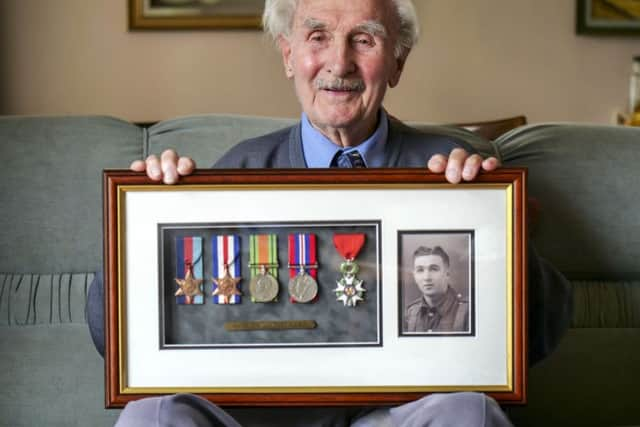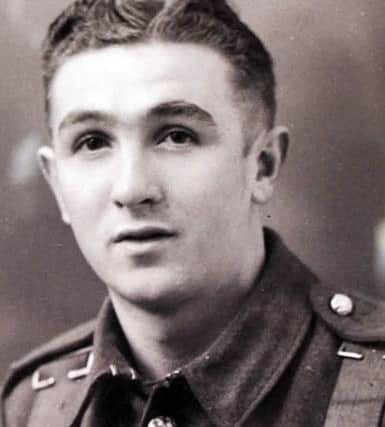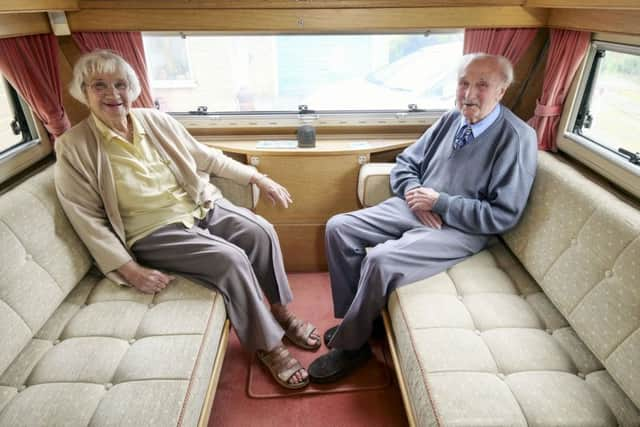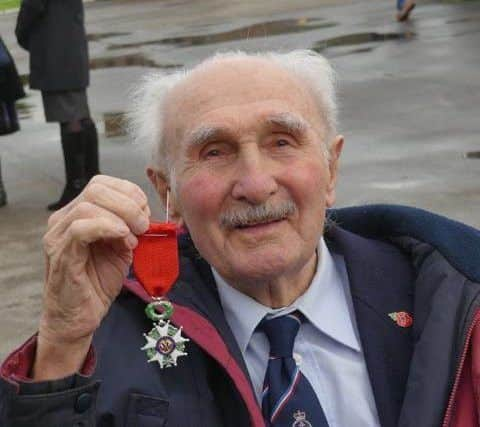Yorkshire D-Day, Dunkirk and Belsen veteran Jim, 100: You hope such a war never happens again
Jim Pass is apologetic as he struggles to get into his bungalow with his walking frame. “I’m not the man I used to be,” says the 100-year-old, who is also dealing with Alzheimer’s disease.
Though getting around is harder than it used to be and his memory isn’t what it once was, Jim is determined to share his extraordinary wartime stories that included participating in the D-Day landings 75 years ago today.


Advertisement
Hide AdAdvertisement
Hide Ad“I think it is important for the simple reason that you hope it never occurs again and that we live in peace with European countries,” he says, sitting in his front room across from his wife Rita.
“It is very important people should be told about what conditions were like during the war. A lot of people never came back, people I knew didn’t come back.”
For many happy decades of retirement long after the conflict, the former newsagent travelled across Europe in his caravan, all the way from Turkey to the Arctic Circle. But the vehicle enthusiast had several very different modes of transport to rely on during his time on the Continent in the Second World War.
Initially as part of the Royal Army Service Corps, Jim was a motorbike dispatch rider in France in the early stages of the war before narrowly escaping death at Dunkirk, going on to train as a glider pilot and then on D-Day getting the vital job of driving an amphibious DUKW vehicle to bring ammunition supplies ashore on D-Day at Sword Beach, one of the five main landing areas in Normandy used by the Allied forces three-quarters of a century ago.


Advertisement
Hide AdAdvertisement
Hide AdJim has lived in Sheffield for more than 30 years with his second wife Rita, but he grew up in Horsforth on the outskirts of Leeds where his father was the manager of a Co-op and as a young man, he developed a love of motorbikes. His first job was a shorthand typist but he was in the middle of military training when war broke out in 1939.
As part of the Royal Army Service Corps, he proved highly useful in France where in addition to his ability to ride a motorbike and deliver vital messages between military lines, Jim’s ability to speak French meant he was used as something of an “unofficial interpreter” when the need arose.
Jim had been part of an ammunition convoy heading to Dunkirk when they got strafed by German planes, causing huge explosions and leaving him on his own. On his way to the beaches, he ditched his bike in a canal so the Germans couldn’t use it.


Advertisement
Hide AdAdvertisement
Hide AdBut making it to Dunkirk – where hundreds of thousands of troops had gathered to await rescue – was far from the end of his difficulties. “I went seven days without food. It wasn’t very pleasant, it was a bit difficult. I just wanted to get back home.”
Eventually Jim swam out to a boat in the hope he could be taken back to England. His memory of the full details of the Dunkirk evacuation are now rather hazy but Rita shows me a copy of an interview the couple gave to Travelling Times in July 2009 where Jim explained his great fortune in making it out alive. He told the magazine that after the boat he had swam out to turned out to been run aground and completely stationary, a launch came to collect an officer.
“I followed him down the ladder but I found myself looking down the barrel of his revolver. ‘Get back soldier’, the officer ordered. The arguments of the sailors on the launch finally got him to relent.”
Jim was taken onto a paddle steamer and was on the top deck when it was hit by a German bomb. He managed to get off the boat before it sank and was among those picked up by a naval destroyer but hundreds of troops who had been below decks on the steamer drowned.


Advertisement
Hide AdAdvertisement
Hide AdOn his return to England, Jim married his girlfriend Molly Dunn and after having his application to become an RAF fighter pilot rejected, was instead trained by the Army to fly Horsa gliders which carried troops.
Jim struggles to explain what he went through and witnessed on D-Day as he drove a DUKW amphibious vehicle bringing ammunition onshore to Sword Beach, where almost 30,000 Allied troops made it ashore and nearly 700 British soldiers died as they encountered fierce German resistance. But he says that on the one occasion he returned to Normandy during a caravanning holiday with Rita many decades later and came close to the area around Sword Beach, he had to leave because of the memories it stirred up.
“I didn’t want to remember it, it was something I wanted to forget. A few people I knew lost their lives there.”
After making it to the devastated city of Caen, which was around 10 miles from Sword Beach and liberated about a month later from the Nazis, Jim and other soldiers slept on the ground and he says that immediately after the war he would sleep on the floor because he was so unused to a bed.
Advertisement
Hide AdAdvertisement
Hide AdAfter D-Day, Jim was tasked with landing his glider in Holland and fought with his comrades across to Germany, passing by the recently-liberated Belsen concentration camp where thousands of people had been kept in terrible conditions. He says the soldiers did not know at the time what had been happening with the Holocaust when they came across prisoners who looked like “skeletons in pyjamas”.
After the war came to an end, Jim returned to Yorkshire and set up a successful newsagent business in Leeds, as well as becoming a father to two boys. He says it is only in recent years he has spoken about his wartime experiences. “It wasn’t the sort of thing I could talk about and I used to hate talking about it,” he says.
In addition to his busy working life, Jim and Molly also developed a love of caravanning and joined the British Caravaners Club, with Jim organising tours of Yorkshire for national members. His talent for promotion was also spotted and he was made chair of the club’s publicity committee – memorably getting coverage for the club’s youth test by sitting it himself at the age of 70.
Following Molly’s death in the 1980s, in 1988 Jim went on to marry Rita, herself a member of the club and a widow. The pair travelled far and wide across Europe, with Italy a particular favourite.
Advertisement
Hide AdAdvertisement
Hide AdThe couple settled in Sheffield after viewing more than 100 properties in an attempt to find a suitable bungalow where they would be able to park their caravan outside, away from a main road.
Rita says after they moved in, the light-hearted Jim decided to name the property ‘Thistle Dew’ (as in ‘This’ll Do’) and a sign bearing the name is outside to this day. They continued their foreign caravanning holidays well into their 90s, before Jim’s increasing ill-health and Alzheimer’s diagnosis around five years ago limited their ability to travel.
Jim says surviving the war changed his outlook on the world. “You have got to make the best of life while you have got it.”
French paid tribute
Jim says he was humbled to be awarded the Légion d’honneur for his service in liberating France at a ceremony three years ago.
Advertisement
Hide AdAdvertisement
Hide AdThe medal is the most esteemed order for servicemen and women who fought to protect France in times of war and on average only around ten British nationals receive it each year.
He was presented with it at a ceremony at the at Yorkshire Air Museum in Elvington near York in 2016 in recognition of his service during the Second World War.
“I felt very proud of that,” he says.
Jim has also been working recently with University of Sheffield speech therapists specialising in supporting Alzheimer’s patients on the creation a book of memories about his life and wartime service.